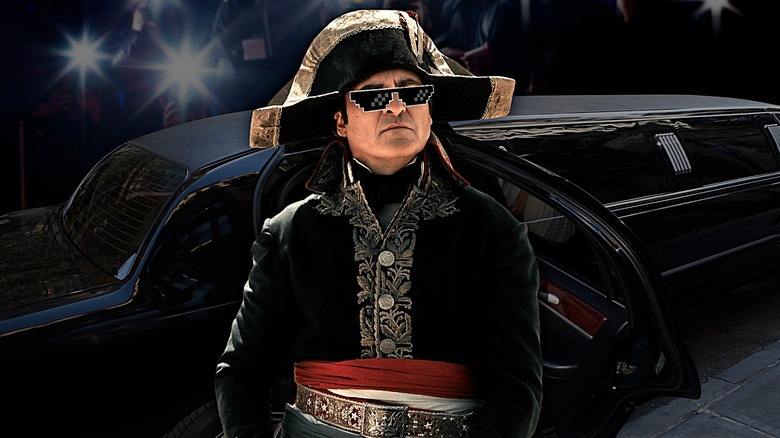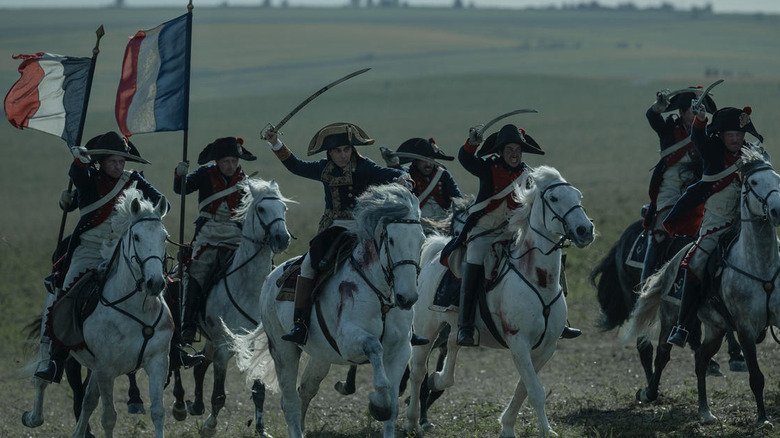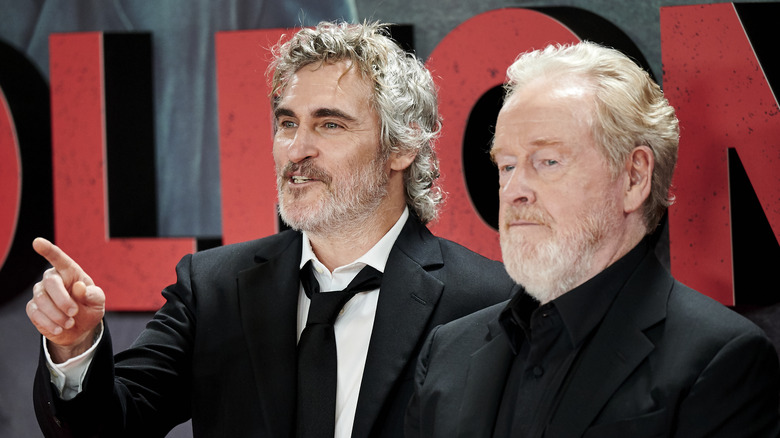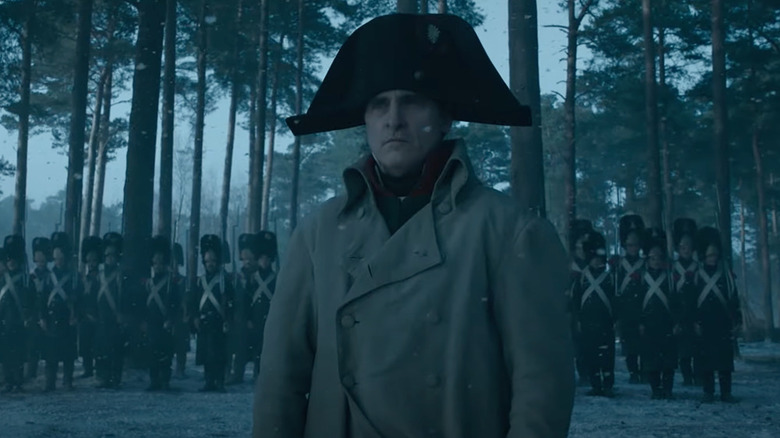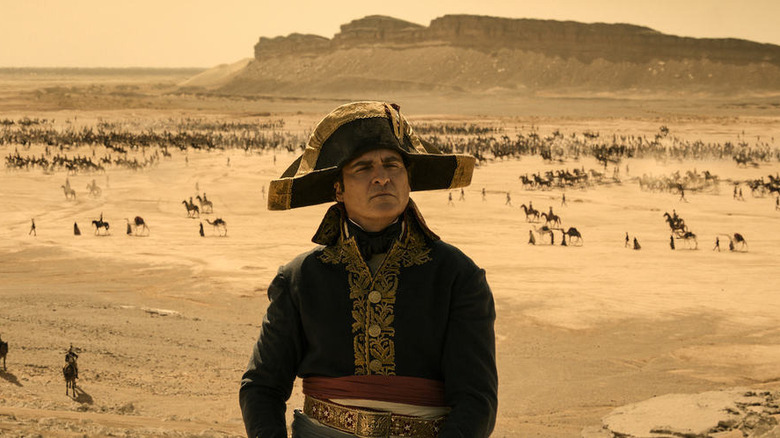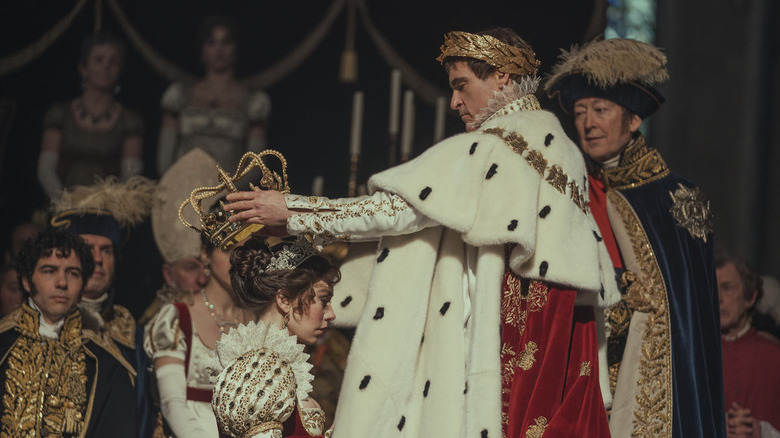Napoleon Vanquished This Thanksgiving's Box Office - Here's Why
Deadline has reported that Ridley Scott's epic biopic "Napoleon" has brought in just shy of $79 million across the international entertainment market over its lengthy opening "weekend." The Hollywood Reporter added that $32.5 of that total came from domestic revenue rolling in from the holiday week — including a healthy $20.4 million over the weekend alone. $46.3 million of that overall total came from the global market.
It may not feel like a huge haul in an era defined by blockbuster opening weekends for superhero flicks and childhood toy franchises, but the results revealed an above-expected demand for the Little Corporal both in the United States and across the world. Most of the Asian markets are still waiting for the release, too, so there are likely more good times ahead for the teams at Apple TV+ and Sony, which produced and distributed the film, respectively. According to Deadline, the release is crushing the opening weekend results of recent comparable films. For example, as of this writing, Scott's French-infused project was performing 86% higher than the 2022 biopic "Elvis" at this point in the release cycle.
While there is always a smorgasbord of elements that decide whether a film does well or not at the box office, there are a few major factors that are clearly contributing to the initial success of "Napoleon." Let's run through some of the biggest reasons that led to its domination of the Thanksgiving box office.
The holiday weekend and European interest helped
Let's start with the most obvious factor here: "Napoleon" had a very lengthy opening weekend to rack up those early ticket sales. In fact, the event technically opened across a five-day stretch — which is closer to an opening week. The film was initially released in most markets on Wednesday, November 22, and ran through Sunday, November 26. In some markets, it was even available for Tuesday showings. Toss in the four-day holiday weekend, and moviegoers had a significantly longer opportunity to see the film.
Deadline also pointed out that Ridley Scott's biopic had an expected leg up from an unsurprising market: Europe. While Europeans may not have been celebrating Thanksgiving, they had a vested interest in viewing the director's treatment of one of the most powerful and terrorizing men in their recent history. They turned out in force from Great Britain to Italy, from Germany to Spain — collectively producing $33 million of the $46.3 million international revenue total. The U.K. and France led the way, contributing well over $10 million in combined sales from their two populations alone.
Big names and old men helped
Another factor that "Napoleon" had going for it was its star power — both in front of and behind the camera. We've already mentioned Ridley Scott a few times now. The venerable British director is already famous for myriad iconic films, including classics like "Alien," "Blade Runner," and "Gladiator." The man's reputation with that last film, in particular, doubtless lent weight to the release of yet another epic historical entry on his film-making rap sheet.
When it comes to Scott's treatment of "Gladiator," the movie is overall historically accurate while simultaneously making massive deviations from the source material (think resurrecting the Roman Republic or killing Commodus in the Colosseum). The desire to see what kind of historical accuracies and liberties the esteemed director would take with Napoleon Bonaparte's story was a curious itch that many moviegoers had to scratch.
All of this doesn't even take into account the lead man himself. Joaquin Phoenix is a masterful actor with stellar performances that include "Gladiator" and "Joker," with countless other impressive outings. He also bears an uncanny resemblance to the titular dictator himself, making his performance a must-see event.
Interestingly, one of the key demographics that the one-two punch of Scott and Phoenix attracted was older male viewers. In fact, in the aforementioned The Hollywood Reporter article, the outlet went so far as to attribute the draw that "Napoleon" had on the older male demographic as a defining factor in why it edged out Disney's "Wish," which shared its opening weekend.
Special effects on ice
"Napoleon" promised the action and excitement of the Napoleonic battlefield — and it didn't disappoint. The fighting opens up with an extended naval/land-based battle sequence before packing up and heading over to Egypt, where the French leader randomly shoots at some pyramids. After this brief deviation, he heads back home, where things get intense quickly.
Once back in mainland Europe, the conqueror fights the battles of Austerlitz and Borodino. The former is one of his greatest victories, and Ridley Scott depicts it as a surprise attack, where Napoleon drowns many of his enemies in the icy waters of a frozen lake broken by cannon fire. The latter takes place during a protracted invasion of Russia. Unlike Austerlitz, this is an unmitigated disaster that ends with the bulk of Napoleon's nearly half a million soldiers dead and scattered across the Russian tundra. Follow this up with his last stand at Waterloo, and there are a lot of action-packed moments scattered throughout the film.
The battle sequences are each unique in their own way. The shots of the line infantry in square formations and ship scenes earlier in the film are very rewarding. But the eye candy really comes during the winter scenes. The Austerlitz ice battle stoked interest early on when it was teased in promotional material, and the blustery invasion of Russia, punctuated by the burning of Moscow, sends chills down one's spine. They are each special — and they all hold up to Scott's typical high-quality visual filmmaking. Toss in the fact that the experience was available in IMAX in many locations, and it's no wonder the gigantic surround-sound option raked in $9 million of the global box office total.
Biopics are popular right now
Biopics are in right now, and "Napoleon" is, in many ways, the culmination of the last few years of dramas based on the lives of famous people. Don't get us wrong — biographical films have been popular practically forever. But the investment in these massive dramatizations of real-life events was cranked up a notch in recent cinematic history. In many ways, they're starting to replace the Marvel Cinematic Universe experience, which hinges on over-the-top production and exciting visuals.
Christopher Nolan's "Oppenheimer" is a prime example of this changing of the guard. The epic film was also released with great success in theaters (including IMAX) earlier in 2023. The film made waves for a variety of factors, including an all-star cast and a serious investment in special effects. This created a frenzy of interest and a FOMO-mania not to miss the experience in theaters.
"Napoleon" is no exception to this new trend of major biopic productions worthy of the biggest of screens. While CGI was certainly a factor, Ridley Scott has gone on record describing many of the practical effects that were also involved. From large-scale models of battle sets to hundreds of men and horses physically on set at the same time, Scott brought the same intensity to the creation of "Napoleon" as any of his numerous similar projects. From the opening battle in "Gladiator" to the wild siege sequences in "Kingdom of Heaven," the director knows how to put together a war scene, and he brings his war-mongering A-game to "Napoleon."
Great Man theory strikes again
One of the most subtle (but important) factors driving the masses to the theaters for the opening weekend of "Napoleon" was the leader's enduring reputation. Love him or hate him, he was one of the most important individuals of the past few centuries and a very real iteration of the Great Man theory of history.
For those new to the term, "Great Man" history is the concept that leaders are naturally born and inevitably drive history forward. While it's a hotly debated theory (that isn't empirically validated), the concept that larger-than-life individuals guide history in certain directions is an attractive one, and it is an idea that pushes people to watch historical accounts of earth-shattering historical figures with the same intense interest that keeps them glued to the screen during a sports injury or NASCAR accident. Questions like "Who is Napoleon?" or "Why did he have such a massive impact on history?" have fascinated the masses for two centuries now. Tuning in to see Ridley Scott and Joaquin Phoenix's oversized answer to that question was an irresistible temptation. It doubtless drove curious people across Europe, North America, and beyond to theaters as soon as the movie was available.
